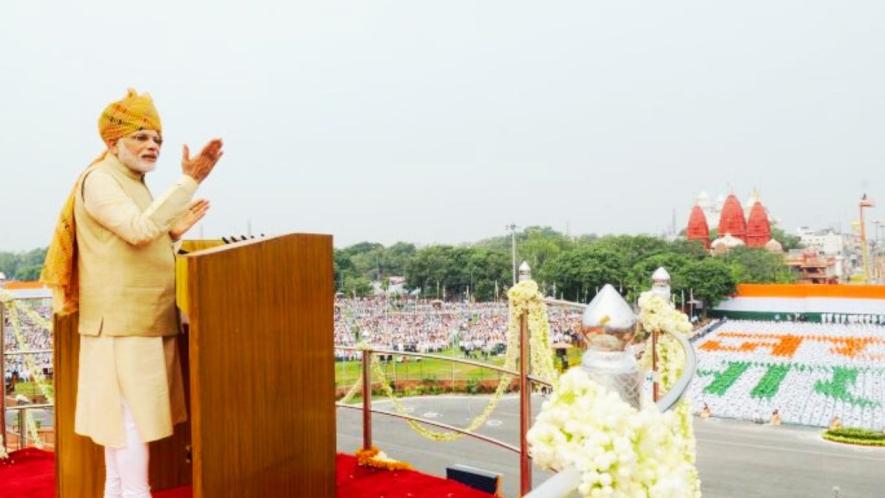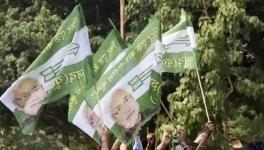PM Modi’s Diwali ‘Gift’ is Paid by People!

Representational Image. Image Courtesy: Flickr
Narendra Modi’s Independence Day speech was expectedly full of blatant untruths. He talked for instance of the great strides that India had made in the manufacturing sector during the years of Bharatiya Janata Party’s (BJP) rule, while the reality is a drastic fall over the past 10 years in the share of the manufacturing sector in GDP (gross domestic product) from 17.5% to 12.6%, a level that had last been crossed in 1960. Such a decline is what economists call a state of de-industrialisation; and it is characteristic of the incumbent Prime Minister that he should pass off a process of de-industrialisation as a great stride made by the country in the industrial sphere!
Likewise, his specifically dragging in the RSS (Rashtriya Swayamsevak Sangh) for praise in an Independence Day speech is a travesty of the truth. It is well-known that the RSS not only did not participate in the struggle for Independence, but its then leader, M S Golwalkar, anticipated even after Independence had been achieved, that the country would not be able to manage its affairs on its own, and would have to invite the British back to run the administration (Ram Puniyani has written about this).
Read Also: When Did India Get Independence?
Let us, however, turn to his main economic announcement which concerns the concessions made with regard to the Goods and Services Tax (GST). He announced the abolition of two GST slabs, the 12% and 28% slabs. Goods and services now falling under the 12% slab will henceforth be charged 5%, and those attracting 28% now will be charged 18%.
Calling this concession a Diwali “gift” of course betrays a repugnant feudal mindset. Taxes are paid by the people; tax revenue comes out of peoples’ money. To call a reduction in the tax revenue paid by the people a “gift” from the government, as if the government’s revenue is its private income, represents an inversion of reason that is analogous to the French Bourbon King Louis XIV’s remark: “L’ État, c’est Moi” (or “The State, that is I”). Such inversion, however, is something one has come to expect from the National Democratic Alliance government, some of whose senior leaders in the past have even referred to the Indian Army as “Modiji’s Army”.
Let us see the full magnitude of the proposed “gift”. It appears (see The Hindu, August 16) that the 28% slab currently accounts for only 11% of total GST revenue. A reduction in this rate to 18% will, therefore, (assuming, quite reasonably, the same denominator, that is, the same value added as before on which GST is levied), entail a loss of 10% of this revenue, that is, 1.1% of the total GST revenue.
Likewise, the 12% slab accounts for 5% of the total GST revenue, and the reduction in this rate to 5% will entail a loss of 7% of this revenue, that is, 0.35% of the total GST collection. The two concessions together will, therefore, amount to a loss of 1.45% of the total GST revenue, and hence a transfer to the public of 1.45% of the total GST revenue. Since the total GST revenue in 2024-25 was Rs 22.08 lakh crore, the total transfer to the public effected through the tax concessions announced by Modi come to Rs 32,016 crore at present, or a mere 0.0967% of the officially-estimated GDP for 2024-25; let us take it as 0.1% in round figures.
Of course, official sources have been busy pointing out the expansionary effects on the economy as a whole of this “gift” to the people; but the net expansionary effect would depend upon how this “gift” is financed. If corresponding to the tax concessions given to the people there is an equivalent reduction in government expenditure, so that the fiscal deficit is not increased, then the expansionary effects of such concessions would be cancelled by the contractionary effects of the cut in government expenditure, causing zero net expansionary effect on the whole.
The possible welfare augmenting effect of tax concessions for the people would be exactly negated if the cuts in government expenditure are made in education, healthcare, employment generation and other such activities. The tax concessions then would have proved to be neither growth augmenting nor welfare augmenting.
But suppose there are no cuts in government expenditure corresponding to the tax concessions announced by Modi, and the concessions only give rise to an increase in the fiscal deficit. Even then, assuming a “multiplier” value of 2, which is by no means unreasonable since these concessions are being given not just to the poorest or to the rural population (in whose case a higher multiplier value might have been expected), but to the public at large, they would only add 0.2% to our annual growth rate, which is an utterly minuscule amount.
It is only a government that is given to hyperboles in describing its own performance, that can claim tax concessions amounting to a paltry 0.1% of GDP as constituting a Diwali “gift” worth even talking about.
If the government was serious about reviving the economy, then it should have undertaken a substantial increase in government expenditure, for a start, for instance, in filling up vacant positions in public education and healthcare institutions with properly trained personnel (not pets of the regime); and it should have financed this expenditure through the imposition of a wealth tax and an inheritance tax.
Wealth inequality in the country, it is now being suggested, is far greater than what was believed till now. The top 1% of the population was earlier estimated to possess about 40% of the country’s wealth. But the US- based wealth management firm Bernstein has now suggested in a report that the top 1% in India is in possession of as much as 60% of the country’s wealth. An exact estimate may be difficult to come by, but no matter what the exact figure is, it is not only clearly one of the highest in the world; but wealth inequality in the country is further increasing.
A revival of the economy, therefore, should ideally have been planned in a manner that simultaneously attacks this scourge of wealth inequality, which is fundamentally against the ethos of a democratic society. And the Independence Day speech of the Prime Minister should have been the occasion for announcing such a revival strategy.
But this is not what the Modi government has attempted to do. It has done precious little to revive the economy, or even to provide relief to the people, but grandiloquently talked of a “Diwali gift”! But then what can one expect from a government that prioritises its public relations over adopting any substantive measures.
RSS chief Mohan Bhagwat has recently admitted that education and healthcare have got so commercialised, and hence so expensive, that they have now, unlike earlier, gone beyond the reach of the common people. This is an important admission that amounts implicitly to an acceptance of the view that these crucial sectors must be the primary responsibility of the government, rather than being privatised in accordance with the neoliberal strategy.
Bhagwat’s admission, however, covers only a part of the truth. The other part consists of the systematic wrecking of government-run institutions by hoodlums and climbers belonging to his own stable. Student hoodlums owing allegiance to RSS prevent any free discussion of ideas in universities. Sub-standard appointments are made, including of persons not satisfying even the stipulated minimum qualifications, to faculty positions in universities; and hand-picked governors of states, in their capacity as university chancellors, appoint RSS favourites as administrative heads of universities.
With this wilful destruction of the quality of universities, why should any ordinary citizen send his ward to such an institution even if doing so was within his means?
Government-run institutions in such crucial areas, in other words, suffer not only from a shortage of funding (in accordance with neoliberal tenets) but also from a wilful destruction of quality (which is a contribution of fascistic outfits like the one Bhagwat heads).
As a result, education is in shambles; healthcare is in shambles; employment generation programmes like the MGNREGS are in shambles. On the 79th Independence Day, the country is in a sorry mess, thanks above all to the combined effect of neoliberalism and its sequel, the rise to power of fascistic elements. There is no inkling of all this, let alone of any remedial measures, in Modi’s Independence Day speech.
Prabhat Patnaik is Professor Emeritus, Centre for Economic Studies and Planning, Jawaharlal Nehru University, New Delhi. The views are personal.
Get the latest reports & analysis with people's perspective on Protests, movements & deep analytical videos, discussions of the current affairs in your Telegram app. Subscribe to NewsClick's Telegram channel & get Real-Time updates on stories, as they get published on our website.
























